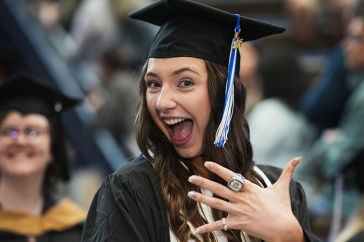
The finalists in this year’s SVIC faced another challenge in addition to the competition: having to present their ideas remotely due to COVID – 19.
Heeding the advice judges offered during the 2019 Social Venture Innovation Challenge helped a team committed to recycling garner three awards in this year’s event, an affirmation that their idea is a good one.
Mikey Pasciuto ’21, Evan Gwynne Davies ’20 and Daniel Marek ’20 promoted Scrapp, a free app that makes recycling easier and aims to help eliminate recycling contamination, which occurs when materials that can’t be recycled end up in the system.
Their plan was named Best Articulated Problem, Most Financially Sustainable Solution and took third place in the Audience Choice awards in the 2020 Social Venture Innovation Challenge (SVIC) held Dec. 2. Nine student teams presented their ideas for addressing sustainability challenges at the local, regional and global level. All of the presentations were done virtually due to COVID-19.
The SVIC is a collaborative, interdisciplinary event, organized at UNH Changemaker Collaborative and co-hosted by the Carsey School of Public Policy, the Peter T. Paul College of Business & Economics and the UNH Sustainability Institute. Entrants shared their ideas on how to solve some of the most pressing issues facing society today. Winning teams shared a total of $15,000 across nine award categories. Videos from winners and all finalist teams can be viewed here.
“Our vision is that ‘everyone can be a changemaker’ and, in fact, given the challenges we face as a society we need thousands/millions of changemakers."
“Last year we submitted our first concept and got knocked out right away,” Pasciuto says. “We really took the criticism we got to heart, and this year explained our position more clearly and presented a smartphone application that is accessible to anyone regardless of location or recycling program type.”
That led one of this year’s judges to offer this praise: “The extra year your team invested improving and perfecting the Scrapp vision and app was well worth it. It’s now a complete, motivating idea that will encourage actionable recycling and measurably help the environment."
Jessica Nelson ’21 claimed the Most Original Innovation prize for Mongo, a plant-based protein derived from India’s organic mung beans that are both sustainable and tasty.
“I’ve been a vegetarian for 10 years and have realized there is a lack of protein options for vegans and vegetarians on the market today,” says Nelson, who is majoring in business administration, entrepreneurial studies and minoring in sustainable agriculture and food systems and sales. “I learned that many consumers avoid soy due to controversial health effects. After much research, I discovered mung beans, which have more protein and fiber with fewer calories than soy-based protein products.”
Mongo is a solid protein that can be cubed and fried or scrambled in stir-fries or added to smoothies. One judge said "It is so amazing such a needed high nutrient plant-based protein alternative has kept such a low profile. This will change dramatically thanks to your vision, smarts and passion.”
The next step for Nelson is to test-market her product in local New Hampshire health food stores next spring and summer. Of presenting her idea virtually, Nelson says “It was exciting to see the large virtual audience and variety of judges that supported the 2020 NH Social Innovation Challenge.”
Pasciuto agreed. “Given the times and the situation we thought everything went great. Everyone involved did an amazing job preparing us through audio visual checks, so everything ran super smooth. The success of the SVIC this year is to their credit entirely.”
Says Fiona Wilson, director of UNH’s Sustainability Institute, “Our vision is that ‘everyone can be a changemaker’ and, in fact, given the challenges we face as a society we need thousands/millions of changemakers. Some teams didn’t walk away with a monetary prize, but they are focusing on important challenges and their solutions have great promise, and we hope the community will reach out to support them with advice, connections and other resources.”
The complete list of winners includes:
Best Articulated Problem: Scrapp ($2,500)
Scrapp is a free app that combats confusion by using a barcode scanning feature to show you how to correctly recycle common household items.
Mikey Pasciuto ’21, mechanical engineering and sustainability dual major, minor in sustainable energy, Evan Gwynne Davies, ’20, civil engineering and Daniel Marek, ‘21 civil engineering
Most Original Innovation: Mongo ($2,500)
Mongo is a sustainable plant-based protein derived from organic mung beans. High in protein and low in calories, Mongo is a tasty alternative to the limited plant-based options.
Jessica Nelson ‘21, business administration: entrepreneurial studies, minors in sustainable agriculture & food systems and sales
Most Impact Potential: HydroPhos Solutions ($2,500)
HydroPhos Solutions is a service company that addresses eutrophication and phosphorus depletion. They utilize phosphorus filtration technology to extract phosphorus from wastewater treatment plants. They then resell this phosphorus to fertilizer companies, recycling the nutrients and extending the lifespan of our global food supply.
Jason Plant, ’23, business administration: entrepreneurship & finance, Daisy Burns ’24, economics with option in public policy and sustainability dual major, Matt Orient ’23, business administration: ISBA & sustainability dual major, Derek Long ‘23, economics, Katie Remeis ’23, |business administration: accounting and finance, minor in environmental conservation and sustainability
Most Financially Sustainable Solution: Scrapp ($2,500)
Scrapp is a free app that combats confusion by using a barcode scanning feature to show you how to correctly recycle common household items.
Mikey Pasciuto ’21, mechanical engineering and sustainability dual major, minor in sustainable energy, Evan Gwynne Davies, ’20, civil engineering and Daniel Marek, ‘21 civil engineering
Most Impactful Story to Engage Stakeholders: Plymouth Cares One-Stop-Shop ($2,500)
Plymouth Cares One-Stop-Shop is a virtual‚ one-stop-shop that integrates all the resources that satisfy unmet basic needs of students at Plymouth State University into one place.
Zachary Eastman ‘21, PSU, business administration and Noah Fiske ’21, PSU, interdisciplinary studies, minor in business administration
Best First-Year Student Entry: ROOTS
ROOTS is a collaboration website that allows students, staff and the community to connect with each other and post ideas or solutions to sustainability challenges.
Kaitlin Phair ’24, neuroscience and behavior, Derek Bobbit ’24, business administration: finance and ISBA, Ella Dandrade ’24, bioengineering and Janet Ogunbuyi ‘24, communication and environmental science
Audience Choice Awards
1st Place: HydroPhos Solutions ($1,000)
HydroPhos Solutions is a service company that addresses eutrophication and phosphorus depletion. They utilize phosphorus filtration technology to extract phosphorus from wastewater treatment plants. They then resell this phosphorus to fertilizer companies, recycling the nutrients and extending the lifespan of our global food supply.
Jason Plant ’23, business administration: entrepreneurship & finance, Daisy Burns ’24, economics with option in public policy and sustainability dual major, Matt Oriente ’23 business administration: ISBA & sustainability dual major, Derek Long ’23, economics, Katie Remeis ’23, business administration: accounting and finance, minor in environmental conservation and sustainability
2nd place: MyGreenPlate ($750)
MyGreenPlate is an app that will allow users to track the sustainability status of their food consumption habits and offer positive reinforcement for sustainable eating habits.
Holly Proulx ’21, environmental engineering and Will Bodewes ’20, mechanical engineering
3rd place: Scrapp ($500)
Scrapp is a free app that combats confusion by using a barcode scanning feature to show you how to correctly recycle common household items.
Mikey Pasciuto ’21, mechanical engineering and sustainability, Evan Gwynne Davies ’20 and Daniel Marek ’20, both civil engineering majors,
-
Written By:
Jody Record ’95 | Communications and Public Affairs | jody.record@unh.edu
















































